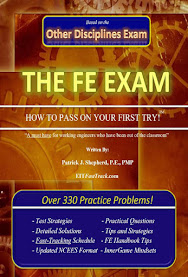A few things one might want to know about the FE Exam –
- Why write the FE exam?
- FE exam experience
- Choosing your FE exam
- How to study for the FE exam
This article will briefly discuss each.
Why Write the FE Exam?
You may have the option to write the FE exam instead of number of technical exams.
The first thing to understand about the FE exam is that it has ~65% pass rate amongst would be American engineering graduates in their final semester. The exam tests their knowledge of mostly underclass material and has no impact on their graduation. Many go into the exam with little to no preparation. It therefore seems right to conclude it is not an especially hard exam.
In fact, the exam falls within the Engineers Canada basic & complimentary studies syllabi as shown below.
I wrote the FE exam after 14 years in industry. I have also written 13 technical exams. I would say the FE exam is a fair exchange for around 2 to 3 technical exams. My advice is that you should write the FE if you can get credit for 4 or more technical exams by writing the FE.
The FE Exam Experience
The Fundamentals of Engineering Exam was shortened to just 5 hours 20 minutes so that it could fit into a single shift at Pearson VUE testing centers.
Writing exams at Pearson VUE may be unlike anything you have done before. The reception is well organized but you need to be there when the doors open. It can take well over a half hour to get into the room and start writing the exam. They will check out your calculator. Make sure if you are using the Casio with the codes on the cover that you let them know it is permitted in the exam. They will give you a locker for your wallet and other personal items. You then go into a very detailed security check where you turn out your pockets and get searched.
The exam room is set up with carrels and a proctor positioned to observe you at all times.
Leaving the room between the two halves of the exam leaves you little more time than to go to the washroom because you have to get through the security process again. You are only allowed 25 minutes for the break.
The smart thing to do as you work through the exam is solve the questions you feel you can easily do and flag about 10% – 20% for your second go through. The flagging capability on the computer makes this easy. The electronic version of the reference handbook is not especially hard to use but it does take time to use it. I would flag every question you need to use the reference handbook for at a minimum.
Choosing Your FE Exam
Make sure you review the exam specifications on the NCEES website as well as their statistics.
I wrote the “Other Disciplines” exam because the specification more aligned with my strengths than the “Mechanical” exam. Thermodynamics & heat transfer is just not much of what I do as an aircraft structures engineer.
You should choose the exam that you feel most confident in. I don’t believe any association in Canada has a policy on which FE exam you need to write.
How to Study
Your success on the exam is dependent on three factors:
- the number of FE exam type problems you have solved
- your command of the FE Reference Handbook
- your mastery of your chosen calculator
The 80/20 rule should be top of mind when preparing for the exam.
Preparation Courses
When I started to prepare for the exam, I first enrolled in the Georgia Tech FE Exam Prep MOOC. It was free and a well-prepared course. But it is mostly passive learning and covers the hardest 10% of the exam – the 10% you don’t need to pass. At the time I was feeling lazy to do more than the MOOC so it at least got me started.
I would not recommend taking a FE preparation course as your primary strategy. It is more important that you spend your time working problems.
Study Groups
If you have been out of school for a while, finding others who are taken or have taken the FE exam can be helpful.
The Reddit r/FE_exam sub is a great place to take questions.
A small list of ongoing study groups by city are listed below. Let us know of more.
| City | Group | Link |
| Calgary | Directions for Immigrants in Trades and Professional Careers | https://directionsforimmigrants.ca/services/study-groups/fundamentals-of-engineering |
Study Materials
Far better than the MOOC was the book by Patrick J. Shepherd “FE Exam: How to Pass on the First Try”. It contains five practice exams that focus on the 80% of questions you need to master to pass. It also comes loaded with extensive tips on the experience of writing the exam and how to strategize for it. If you only have only limited time time to to study, the Shepherd book should be your tool.

The large PPI Lindeburg preparation manuals and sample examinations will kick your preparation into high gear. The study materials wills quickly remind you of the concepts you need. The questions and practice exams in these manuals are slight more difficult than the FE so you should be confident after this preparation.

An alternative to the Lindeburg books is the PPI “Learning Hub Bundle”. You usually can get a discount code by listening to the Engineering Career Coach Podcast. I wouldn’t pay for more than one month of access. Currently it is listed for $59 USD / month.
The FE Reference Handbook
You need to get very familiar with the FE Reference Handbook. This handbook is actually a pretty good general reference and you can often spot people who have written the FE in Canada as they might have a copy on their bookshelf. Once you have signed up for the exam on the NCEES website, you can download the handbook. You can also buy the paperback.

Your Calculator
Previously I covered which calculators are allowed on the FE and the strengths and weaknesses of each. But more important than selecting the calculator is knowing how to use it. The first thing you should do in your exam study is sit down and thoroughly review the calculator manual. Then do this again a couple times during your study period. This will be of benefit even if you have used the calculator for years. You need mastery of every function. This will make the difference between the exam being a time crunch or a leisure.
Final Thoughts
The FE exam is not an especially hard exam. It is multiple choice and covers basic engineering knowledge. It is definitely an exam you can over-prepare for.
I myself wrote the FE exam and left well over 90 minutes early. I did feel that I had over-prepared but it was far less preparation than the technical exams I would have had to otherwise written. So the overwhelming feeling leaving that day was of happiness and a little guilt of taking advantage of an easier path.


